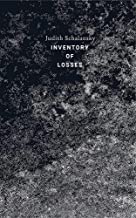An Inventory of Losses by Judith Schalansky 2018
I saw this book on a table during a random walk through the Point Reyes Book Store in California and chose it as my ‘buy a book in every independent bookstore’ selection for the day. I had read Schalansky’s prior book, ‘The Atlas of Remote Islands’ which I loved because of its quirkiness and strange take on the topic as well as the detailed histories and bios associated with each island.
This book travels similar ground but instead of the theme being islands, it focuses on losses—lost people, places, and objects. In her preamble, Schalansky catalogues a long list of losses which occurred just while she was working on this book. Among the dozens she includes are the extinction of the Bramble Cay mosaic-tailed rat native to the Great Barrier Reef, the destruction of the Great Mosque of al-Nuri in Mosul, Iraq, and the disappearance of a Boeing 777 en route from Kuala Lampur to Beijing). She balances these losses with another list of new findings during the same period including the discovery of a hitherto unknown novel by Walt Whitman and locating the wrecks of the H.M.S. Erebus and Terror from the ill-fated Franklin expedition in 1848 to the Arctic. These few examples give you some sense of her thinking, detail-orientation, and compassion for the lost and the found.
This book is a series of 12 chapters, each one introduced by one or more historical ‘footnotes’ of explanation that lead into a story about the lost object, place, or person. From the last Caspian Tiger dying in the Roman Colosseum to the Greek poet Sappho whose 6th C BCE poetry has largely vanished, from the lost island of Tuanaki where war and property were unknown to Otto Von Gericke, a Swiss physicist who claimed to have reconstructed the skeleton of a unicorn, Schalansky walks the reader through fascinating though often confusing tales, some told in the first person and some by an omniscient narrator. The book left me wondering what I had just read and experienced, much like the novels of my favorite writer W. G. Sebald. Both of them are searching for some reality that transcends time, memory, and experience, and both of them generously share that search through their writing, inviting us, the readers, to take that journey with them.
If you’re looking for an adventure novel or a traditional non-fiction fact-filled book, this is not for you. On the other hand, if you want to journey to fascinating places and meet unusual people and lose your daily, objective, concrete self, join Schalansky in this literary adventure. I hope she’s hard at work on her next book which I am certain will be just as challenging and captivating.



